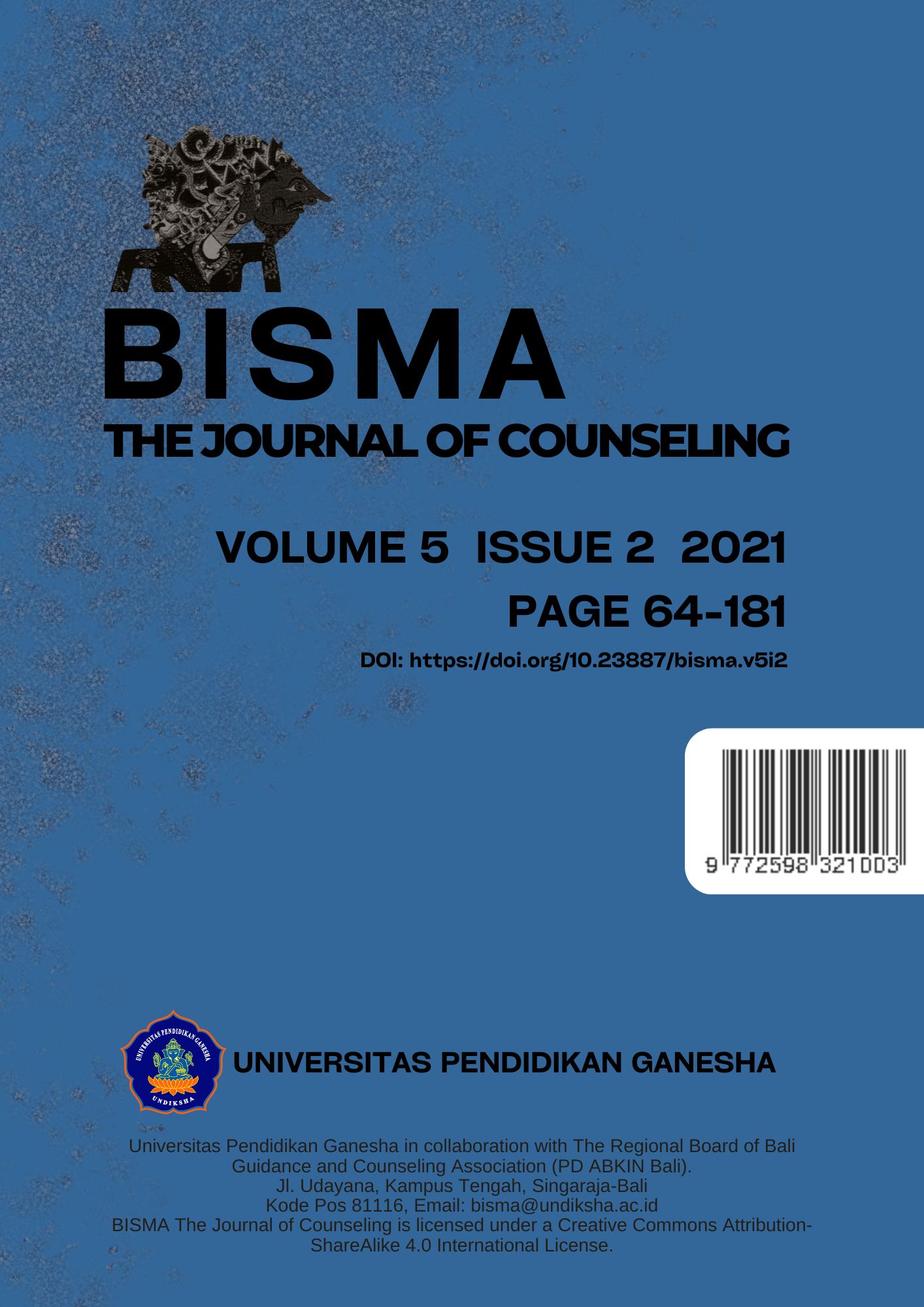Development of Consistency Personality Measurement Instruments on Students at SMA Dwijendra Bualu
DOI:
https://doi.org/10.23887/bisma.v5i2.37915Keywords:
Personal consistency character, research and development, guidance and counselingAbstract
This research is a type of research and development. Measurement of personality consistency was carried out by testing the validity of the instrument items by applying the product moment correlation formula and testing the reliability of the questionnaire with Cronbach's Alpha coefficient. Based on the VC calculation on the content validation test with the Gregory formula, the results are 1 or > 0, it is stated that the personality consistency character instrument is very valid. The results of data analysis conducted to determine the validity of items using the product moment formula obtained 39 items declared valid or very good. Based on these results, it is expected that students are able to develop personality consistency so that they have goals and efforts or continuous development, this is still needed even though they have succeeded in achieving their goals in life.
References
Ade, IN (2014). Test and Non-Test Techniques.
Arikunto, S. (2018). Fundamentals of Educational Evaluation (3rd ed.). PT Bumi Aksara.
Balkis, S. (2016). IPS AS A PERSONAL FORM WITH CONSISTENCY, INTEGRITY, AND SYNERGY AS A CHARACTERISTICS OF THE NATION'S IDENTITY. 6.
Burhanuddin, A. (2013). Data Collection and Research
Instruments. Dalyono, M. (2010). Educational Psychology. Rineka Cipta.
Dewi, MK (2017). The Influence of Interpersonal Intelligence and Self-Consistency on Mathematics Learning Achievement. JKPM (Journal of Mathematics Education Studies), 2(1), 14. https://doi.org/10.30998/jkpm.v2i1.1888
Firzal, Y. (2010). Research Instruments.
Hayati, A. (2018). Good Instrument Requirements (Valid, Reliable, Objective, Practical, Norm).
Hendryadi. (2017). CONTENTS VALIDITY: EARLY STAGE OF QUESTIONNAIRE DEVELOPMENT. Journal of Management and Business Research (JRMB) UNIAT Faculty of Economics, 2(2), 169–178. https://doi.org/10.36226/jrmb.v2i2.47
Komalasari, G., Wahyuni, E., & Kasih. (2014). Counseling Theory and Techniques. PT INDEX.
Leonard, L. (2015). Study of the Role of Self-Consistency on Mathematics Learning Achievement. Formative: Scientific Journal of MathematicsNatural Sciences Educationand, 3(2). https://doi.org/10.30998/formatif.v3i2.116
Leonard, L., & Supriyati, SK (2015). The Role of Learning Mathematics on Students' Self Consistency (Survey of High School Students in Karawang Regency in 2010/2011). Formative: Scientific Journal of MathematicsNatural Sciences Educationand, 1(2). https://doi.org/10.30998/formatif.v1i2.70
Majid, MFAF, Nalva, MF, & Baharuddin, B. (2019). Self Control in Improving Academic Learning Consistency: Study of PAI Students at the Masters Program of UIN Sunan Kalijaga Yogyakarta. COUNSELING: Scientific Journal of Research and Its Application, 1(1), 41–48. https://doi.org/10.31960/konseling.v1i1.339
Marsudi, & Zahrok, S. (2017). STUDY OF CONSISTENCY OF ATTITUDES AND ACTIONS IN INDONESIAN SCIENCE FIELD. Journal of Social Humanities, 10(2), 150. https://doi.org/10.12962/j24433527.v10i2.2836
Mulyana, A. (2018). Child Personality Or Student Personality in School. Navel. (2012). Development Research (Development Research).
Prawiro, M. (2020). The Meaning of Consistent: Understanding What Is Consistent, Traits and Examples.
Putra, RD (2014). Example of Construct validity (Construct validity). Ramayulis. (2012). Islamic Education Science.
Riadi, M. (2017a). Definition, Types and Methods of Calculating Validity. Riadi, M. (2017b). Definition, Characteristics, Testing and Reliability Formulas.
Riyanto, OAA (2015). ETHICS EDUCATION BUILDING EARLY CHILD PERSONALITY. 1, 12.
Salmi, F. (nd). HR Management Strategy.
Setiawan, S. (2021). Definition of Character.
Soekotjo, I. (2012). Definition of Personality.
Sugiyono, Prof. Dr. (2015). Educational Research Methods (Quantitative, Qualitative, and R&D Approaches). Alphabet.
Sumadiyasa, IM (2015). The Effect of Behavioral Counseling Modeling Techniques with Positive Reinforcement to Improve Self-Efficacy of Alienated Students in Class X SMK Negeri 1 Seririt 2014/2015 Academic Year. Counseling Guidance Department, Faculty of Education, UNDIKSHA.
Syamsu, YL (2003). Foundations of Child Development Theory.
Wijaya, P. (2021). Consistency Is: Meaning, Way, Importance of Self Consistency, and Examples.
Yusuf, AM (2017). Educational Assessment and Evaluation. PT Fajar Interpratama Mandiri.
Yusuf, F. (2018). Validity and Reliability Test of Quantitative Research Instruments. Tarbiyah Journal: Scientific Journal of Education, 7(1). https://doi.org/10.18592/tarbiyah.v7i1.2100
Zakky. (2020). Understanding Research Instruments According To Experts And In General.
Zubaedi. (2012). Character Education Design: Its Conception and Application in Educational Institutions. Kencana Prenada Media Group.








